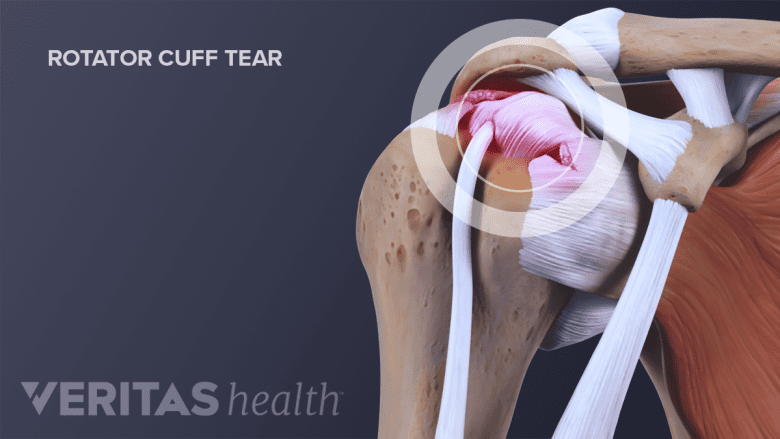The shoulder’s rotator cuff can tear slowly over time or suddenly, as the result of a fall, sports-related collision, or other trauma. Whether a tear occurs gradually or all at once, several common signs and symptoms may appear.

Top 4 signs and symptoms of a rotator cuff tear
If you have a rotator cuff tear, you may be experiencing the signs and symptoms described below. Keep in mind that even if you have all the classic signs and symptoms of a tear, the underlying cause may be something else. A physician who is familiar with shoulder injuries can provide an accurate diagnosis.
1. Shoulder pain
A rotator cuff tear may produce a dull, aching pain in your shoulder. Raising and lowering your arm may trigger pain or cause pain to worsen.
While not common, severe pain is possible, particularly if the tear is large and was caused by a fall or other trauma.
2. Trouble sleeping
The pain from a rotator cuff tear can be hard to ignore when you’re trying to get comfortable in bed. In fact, many patients who have rotator cuff tears say trouble sleeping is the main reason they sought medical care.1Jacobson BH, Boolani A, Dunklee G, Shepardson A, Acharya H. Effect of prescribed sleep surfaces on back pain and sleep quality in patients diagnosed with low back and shoulder pain. Appl Ergon. 2010;42(1):91-97. doi:10.1016/j.apergo.2010.05.004
Sleep loss can be especially troublesome for people who like to sleep on the affected side, because putting pressure on the injured shoulder is typically painful.
3. Shoulder weakness
In addition to pain, a damaged rotator cuff may cause weakness. Tasks that require raising your arm, such as washing your hair, may seem challenging.
Weakness may limit your shoulder’s active range of motion. For example, if you have a full-thickness tear—meaning a muscle or tendon is torn all the way through—you may not be able to raise the affected arm above chest height at all.
4. Shoulder popping or crackling
The muscles and tendons that make up the rotator cuff help stabilize the shoulder’s ball and socket joint. An injury to the rotator cuff can change the way the ball and socket fit and move together. This change, in turn, may result in a popping or crackling that medical professionals call crepitus.
Shoulder crepitus without other symptoms is typically not a cause for concern.
Read more about Crepitus on Arthritis-health.com.
Other possible symptoms of a rotator cuff tear include shoulder stiffness, loss of passive range of motion, swelling, and tenderness.
Read more about Rotator Cuff Injuries: Symptoms
Rotator cuff tears with no symptoms
Research suggests that more than half the people with rotator cuff tears do not feel any symptoms.2Minagawa H, Yamamoto N, Abe H, et al. Prevalence of symptomatic and asymptomatic rotator cuff tears in the general population: From mass-screening in one village. J Orthop. 2013;10(1):8-12. Published 2013 Feb 26. doi: 10.1016/j.jor.2013.01.008 However, symptoms may appear over time if the tear gets worse.3Yamaguchi K, Tetro AM, Blam O, Evanoff BA, Teefey SA, Middleton WD. Natural history of asymptomatic rotator cuff tears: a longitudinal analysis of asymptomatic tears detected sonographically. J Shoulder Elbow Surg. 2001;10(3):199-203. doi: 10.1067/mse.2001.113086
When to see a doctor
If you think you have a rotator cuff tear, consider making an appointment with a physician who is familiar with diagnosing and treating shoulder pain. He or she will be able to identify the underlying cause of your pain, whether it is a cuff tear or another problem, such as a SLAP tear, tendonitis, arthritis, or bursitis.
When urgent or emergency care may be needed
The need for medical care may be more urgent if your symptoms include numbness, weakness, tingling, or pins-and-needles in your shoulder, arm, or hand.
Immediate medical care is recommended if you’re in severe pain, your symptoms affect both sides of your body, or you experience severe weakness, uninterrupted numbness, or difficulty controlling movement in your hand, arm, or shoulder.
Next steps
If a licensed medical provider has diagnosed you with a rotator cuff tear, he or she will recommend one or more treatment options. The majority of people with rotator cuff tears receive nonsurgical treatment, such as resting the shoulder, pain medication, and physical therapy. Surgery may be recommended if the tear is severe or symptoms persist for several weeks or months.
Feel free to ask your provider questions about the treatment plan. Let them know if you have concerns about being able to follow through with their recommendations.
Learn more:
- 1 Jacobson BH, Boolani A, Dunklee G, Shepardson A, Acharya H. Effect of prescribed sleep surfaces on back pain and sleep quality in patients diagnosed with low back and shoulder pain. Appl Ergon. 2010;42(1):91-97. doi:10.1016/j.apergo.2010.05.004
- 2 Minagawa H, Yamamoto N, Abe H, et al. Prevalence of symptomatic and asymptomatic rotator cuff tears in the general population: From mass-screening in one village. J Orthop. 2013;10(1):8-12. Published 2013 Feb 26. doi: 10.1016/j.jor.2013.01.008
- 3 Yamaguchi K, Tetro AM, Blam O, Evanoff BA, Teefey SA, Middleton WD. Natural history of asymptomatic rotator cuff tears: a longitudinal analysis of asymptomatic tears detected sonographically. J Shoulder Elbow Surg. 2001;10(3):199-203. doi: 10.1067/mse.2001.113086

